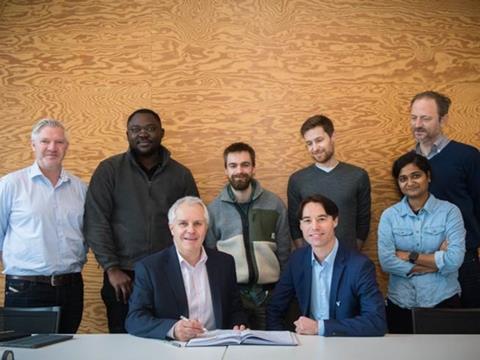
Mura Technology has signed a five-year research partnership with Ghent University’s Laboratory for Chemical Technology (LCT) to build a continuous flow, pilot scale testing facility for hard-to-recycle polymers – aspiring to gauge the potential of products from circular feedstocks and aid future technology expansions.
Hydro-PRT is an advanced plastics recycling process developed by Mura Technology. Unlike other recycling technologies (e.g. pyrolysis), it utilizes supercritical water, or water under elevated pressure and temperature, to convert plastic waste into hydrocarbons.
As such, it is described as an efficient and scalable process that enables a range of plastics, including post-consumer packaging, to be recycled. It is also said to produce high yields of recycled hydrocarbons, which can then be used to produce ‘virgin-quality’ recycled plastics.
Mura Technology adds that the process allows for the same material to be recycled indefinitely, unlocking the potential for reduced dependence on fossil resources and a step forward in circularity for plastics.
Positioned in the European Commission’s Joint Research Centre technical report as a complementary process to traditional mechanical recycling, Hydro-PRT is thought to offer an approximate carbon footprint reduction of 50% compared to two pyrolysis technologies – a step anticipated to help customers meet their Net Zero targets.
Both Mura Technology and LCT – which is described as a ‘world-leading academic institution dedicated to minimizing the environmental impact of chemical processes’ – express their desire to expand the global capacity to process more waste plastics into valuable feedstocks, both for the chemicals sector and the wider plastics value chain.
Dr Steve Mahon, CEO of Mura Technology, commented: “Our new, long-term partnership with Ghent University will help us understand fully the exciting capabilities of our Hydro-PRT process, enabling us to provide research opportunities and create partnerships with the wider value chain.
“The knowledge and expertise of the Laboratory for Chemical Technology in advanced recycling and petrochemical sectors makes them natural partners to help develop the potential of our technology and really showcase the benefits of advanced recycling.”
Professor Kevin Van Geem, LCT professor and CTO of CAPTURE, continued: “Mura’s Hydro-PRT technology not only offers a sustainable alternative for plastic waste management but also contributes to the transition towards a circular economy by reducing emissions, conserving resources and maximizing efficiency and effectiveness. Moreover, Mura’s transparent approach to operations and commitment to accountability convinced me to go for this long-term collaboration.”
“Mura is committed to the high-quality science that Professor Van Geem’s team is renowned for publishing,” added Dr Geoff Brighty, head of Sustainability at Mura Technology. “We look forward to future joint publications which we believe will be critical to underpinning future policy and practice in this area and provide confidence in the achievement of regulatory targets for waste recycling and net zero.”
The announcement comes after Mura Technology opened a commercial-scale advanced recycling plant late last year – this one dedicated to its HydroPRS technology. The plant processes ‘unrecyclable’ flexible and rigid mixed plastics into recycled hydrocarbon feedstocks at a reported capacity of 20ktpa.
In another move set to help phase out fossil resources, the company has also signed a product offtake agreement with Neste to convert products from its plant into feedstock for new plastic production.
We also spoke to Nextek about COtooCLEAN, its water-free cleaning process to convert post-consumer PO films into food-grade materials; the funding it has received from the Alliance to End Plastic Waste to build a new demonstration plant; and the way in which external parties can get involved in the project.
If you liked this story, you might also enjoy:
Report: The ultimate guide to global plastic sustainability regulation
The Brief: Oxo-(bio)degradables: the who, what, and why of breaking down fossil-based plastics
Sustainable Packaging Summit: How Kraft-Heinz uses collaboration to drive innovation
The Brief: Using ocean-bound plastic in packaging – how, why and should we?














No comments yet